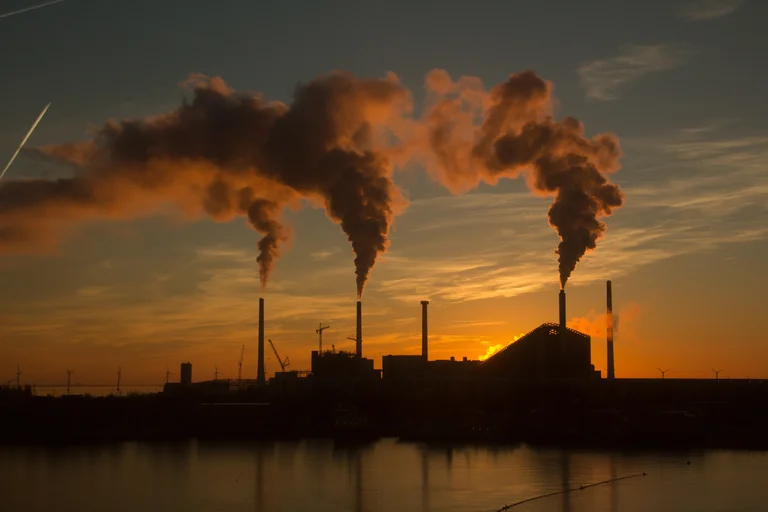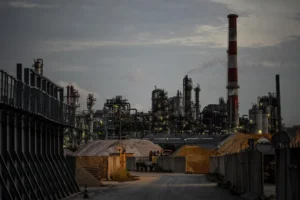
Health Effects Of Oil And Gas Pollution In The United States
Oil and gas are the backbone of America’s energy system. But behind the fuel that runs industries, heats homes & powers cars a growing health crisis. Recent studies show that oil and gas pollution in the United States causes over 90,000 premature deaths each year, along with thousands of cases of asthma, cancer, and other illnesses.
This blog explains the health effects of oil and gas pollution, the communities most affected, and the urgent need for solutions in U.S
What Is Oil and Gas Pollution?
Oil and gas pollution comes from several sources, including:
1. Air emissions
2. Flaring Of Gas
3. Wastewater
1. Air Emissions:
Oil & gas operations release harmful gases like methane, nitrogen oxides & organic flammable compounds into the air. These pollutants get worse smog & harmful for human health.
2. Flaring of gas:
Gas flaring is the burning of excess natural gas during drilling or refining. It releases carbon dioxide, smoke & toxic chemicals that pollute the atmosphere.
3. Wastewater:
Drilling & hydraulic fracturing produce wastewater that is is filled with chemicals and heavy metals and salts. It can reach water sources & soil if not treated properly.
Health Effects of Oil and Gas Pollution in the U.S.

1. Premature Deaths from Air Pollution:
According to a 2025 study in The Guardian, oil and gas air pollution is responsible for over 91,000 premature deaths each year in the U.S. Pollutants like fine particulate matter (PM2.5) enter the lungs & bloodstream, increasing risks of stroke, heart disease & respiratory illness.
2. Asthma and Breathing Problems:
Childhood asthma & other respiratory conditions are more common in communities close to oil and gas facilities. According to the same study, oil and gas pollution is responsible for 216,000 cases of early childhood asthma annually. Smog is made more serious by exposure to nitrogen oxides & volatile organic compounds (VOCs), which makes breathing more difficult for those who have COPD or asthma.
3. Cancer Risks:
Some of the chemicals released by oil and gas mining, like formaldehyde, toluene & benzene, are carcinogenic. Leukemia is one of the cancers that has been connected to long-term exposure to these chemicals. according to studies, and benzene has been identified by the National Cancer Institute as a known carcinogen . Communities that live close to oil and gas wells are at a much higher risk of developing cancer.
According to a 2016 study that was published in the Journal of the National Cancer Institute, people who lived within a mile of oil and gas operations were 30% more likely than those who lived farther away to develop cancers like leukemia.
4. Pregnancy and Infant Health Issues:
10,350 preterm births in the United States are attributed to oil and gas pollution each year. Additionally, research has shown that the chemicals used in oil and gas operations can impact fetal development, raising the risk of neurodevelopmental disorders in children.
5. Mental Health and Stress:
Living near to gas flares or oil fields can cause physical health problems & can lead to long-term stress & anxiety. Communities are frequently faced with issues like noise, smell & long-term exposure anxiety, all of which cause mental health issues.
Who Is Most Affected?
Oil and gas pollution does not impact everyone equally. Studies show that Black, Hispanic, Indigenous, and low-income communities are suffer the most affected because:
- Many live near refineries, pipelines, or drilling sites.
- Limited access to healthcare makes it harder to manage pollution-related illnesses.
- Environmental racism has historically placed polluting industries near excluded communities.
Accordingly, pollution in the US is a problem for both the environment and social justice.
The Economic Burden of Health Issues:
The health effects of oil and gas pollution are not just an individual burden but an economic one as well. The U.S. Public Interest Research Group (PIRG) estimates that oil and gas pollution costs the U.S. about $77 billion annually in healthcare expenses. These costs stem from treating diseases such as asthma, heart disease, and cancer, all of which are exacerbated by exposure to pollutants from oil and gas extraction activities.
What Can Be Done to Protect Public Health?
1. Stronger Regulations:
To reduce the health risks posed by oil and gas pollution, stronger regulations are essential. Implementing stricter air quality standards, reducing emissions of harmful gases, and ensuring proper disposal of wastewater and chemicals can significantly lower pollution levels. Moreover, enforcing these regulations is equally important to hold the industry accountable for its environmental and health impacts.
2. Investing in Clean Energy:
The most effective long-term solution is transitioning toward cleaner, renewable energy sources. By reducing dependence on oil and gas, we can decrease pollution levels and protect public health. Wind, solar, and geothermal energy are cleaner alternatives that do not contribute to the same health risks.
3. Health Monitoring for Affected Communities:
Regular health screenings, pollution monitoring & stronger community protections can help reduce long-term risks.
4. Community Awareness:
Raising public awareness about the health impacts of oil and gas pollution can lead to more community-driven actions and demand for change. Environmental advocacy groups play a crucial role in educating the public and pushing for stronger regulations to protect vulnerable populations from the harmful effects of fossil fuel extraction.
Millions of Americans are impacted by the serious and pervasive health effects of oil and gas pollution, especially in areas near extraction sites. There is no denying that this pollution has negative effects on mental health, cancer, and respiratory conditions. We can start addressing these public health hazards and building a more sustainable, healthy future for all Americans by enforcing stricter laws, funding clean energy, and increasing awareness.
Read more related article > https://www.climatechallange.com/fossil-gas-leaks-and-their-impact-on-human-health/